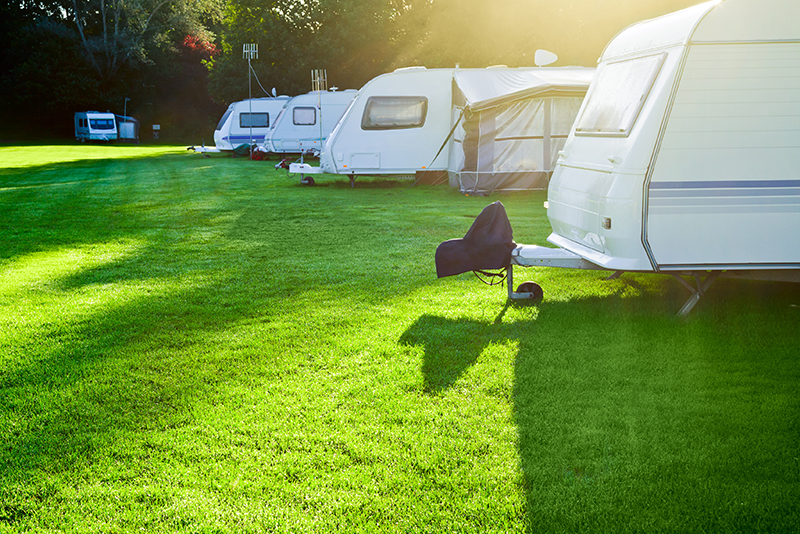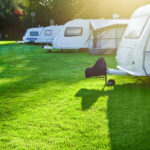
As we return to the closest we have been to some sort of normality, holidays are back on the cards. However, it is looking like staycations are going to remain the primary holiday of choice again this year.
Caravans and Recreational Vehicles carry multiple fire risks, including fires resulting from unattended cooking; overheating electronic and electrical appliances; open fires, faulty electrical wiring; candles and other open flames e.g., smoking, matches and lighters, flammable liquids, and aerosols; and barbeques and campfires.
The lithium-Ion batteries found in laptops, tablets, mobile phones, children’s toys and electric scooters and bicycles may also pose a specific fire risk in this environment. A Lithium-Ion battery which has been damaged or over-charged for example, will cause it to become hot and potentially start smoking or burst into flames. Conventional fire extinguishers cannot effectively extinguish a Lithium-Ion battery fire only specialist extinguisher such as the Firechief Lith-Ex extinguisher is suitable.
It is incredibly important that fire safety measures are not forgotten when re-opening caravan and holiday parks. According to government statistics, in England, ‘on average 360 fires per year occur in caravans’.
Re-opening is a good time to review the risk assessments for fire safety equipment, ensuring it has all been serviced and is in full working order. In line with BS 5306 standards, in venues like holiday parks, fire safety equipment also needs to be protected from accidental damage, weather, vandalism etc. For all fire safety equipment stored outside it is important that they are kept in cabinets, boxes or covers to ensure they are protected and don’t get damaged. View our full range here of cabinets etc for extinguishers, hoses and hose reels.
As well as fire extinguishers and hoses etc, fire signage is just as important especially in a location such as a holiday park. Signs should include fire exit signs, escape routes, signs to show where specific fire safety equipment is located and also those signs that show where assembly points are located. Firechief can also provide these signs for you, you can enquire here
The Government have also provided some safety tips for camping and caravanning:
- Ensure caravans and tents are at least 6 metres apart and away from parked cars, to reduce the risk of fire spreading
- Keep a torch handy for emergencies – never use lighted candles
- Make sure you know the campsite’s fire safety arrangements and check where the nearest telephone is
Using gas cylinders
- Don’t use petrol or paraffin to light a solid fuel stove
- Keep flammable liquids (such as petrol and gas cylinders) outside and away from children
- Only change gas cylinders when they’re completely empty and store them away from caravans and vehicles
- Make sure the gas pipe connection is secure. If you suspect a leak, turn off the main cylinder valve
- Never smoke whilst changing your gas
What to do if there is a fire
- Keep calm and get everyone out as quickly as you can
- Call the fire and rescue service and give the exact location. Give a map reference if possible, or a landmark nearby such as a farm or pub
When staying in a tent it is important to never use candles in or near a tent – torches are much safer.
Top Tips when staying in a tent:
- Keep cooking appliances away from the tent walls as they could easily set alight
- Never cook inside a small tent
- Don’t cook near flammable materials or long grass, as they can set alight easily
- Make sure you know how to escape by cutting your way out of the tent if there is a fire
- Ensure everyone knows how to put out clothing using – stop, drop and roll
- Do not smoke inside the tent
Top Tips when staying in a caravan:
- Fit and test a smoke alarm in your caravan
- Make sure you take extra care when cooking – do not leave pans unattended
- Turn off all appliances before going to bed or leaving the caravan
- Make sure ashtrays are made of a material that cannot burn
- Don’t dry clothes over the stove
- Remove any litter/rubbish near the caravan to reduce the risk of fire spreading
- Make sure the caravan is ventilated and never block any air vents – this is to avoid a build-up of poisonous gases
The Firechief range includes high-performance fire extinguishers, fire blankets, first aid kits, lithium-ion fire extinguishers for your home and leisure time. For more information, call us on +44 (0)330 999 0019 or email sales@firechiefglobal.com.
The information contained within this blog is provided solely for general informational and educational purposes and is not intended as a substitute for professional advice. Before taking any actions based upon this information, we advise the reader to consult any and all relevant statutory or regulatory guidance and where felt necessary to consult a qualified fire or industry regulation professional. The use or reliance on any information contained herein is solely at the reader’s risk.

